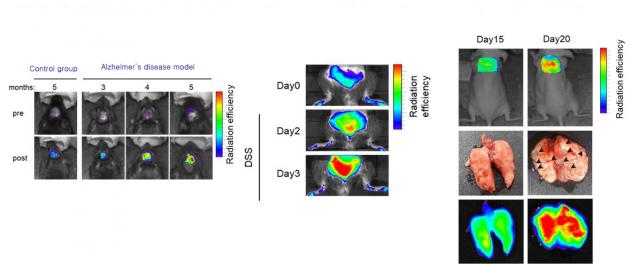Local researchers said they have developed a technology that can monitor and track inflammation in the body in real-time.
The joint research team -- one group led by Dr. Kwon Ick-chan at the Theragnosis Research Institute of the Korea Institute of Science and Technology (KIST), and the other led by Professors Cho Nam-hyuk and Kim Hye-sun at Seoul National University College of Medicine -- said they developed a new fluorescent substance that helps observe inflammatory enzymes.

Poorly controlled inflammatory responses cause arthritis, gout, and Alzheimer's disease. It is already known that a specific protein called inflammasome is activated in these inflammatory diseases. However, existing technologies could analyze the inflammasome activation in the body, only in time and space. Some researchers have tried genetic manipulations to induce real-time observations.
The research team paid attention to caspase-1, which plays a significant role in the early stage of inflammation. The researchers conjugated a substance, cut by caspase-1, with fluorescent material and a light extinction material, to reduce the noise from the fluorescence and maximize sensitivity. Then, the researchers created a new fluorescent material that can be used for imaging.
The research team applied the fluorescent substance to various animal tests for Alzheimer’s disease, colitis, and cancer, and obtained images of changes in caspase-1 in real-time.
The new technology enables early diagnosis of inflammatory diseases by quickly and directly observing enzymes involved in the early stages of inflammation, the researchers said. Also, the fluorescent material is not toxic and rapidly decomposes in the body, thus making it highly biocompatible, they said.
“The technology is expected to be used for real-time monitoring of inflammatory substances, early detection of inflammatory diseases, development of therapeutics and evaluation of their efficacy,” Kwon at KIST said.
The joint research team’s paper, “Non-invasive in vivo imaging of caspase-1 activation enables rapid and spatiotemporal detection of acute and chronic inflammatory disorders,” was published in the latest issue of Biomaterials, an international journal in biomaterials.
The study was supported by the Ministry of Science and ICT, KIST, the National Research Foundation of Korea’s Biomedical Technology Development Project, and Seoul National University Bundang Hospital.

